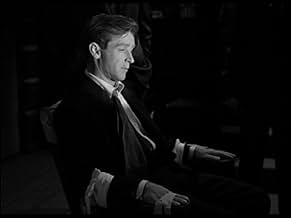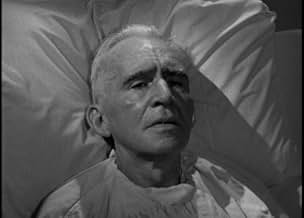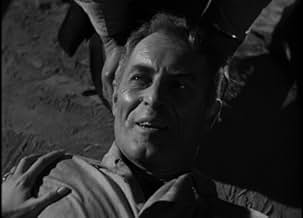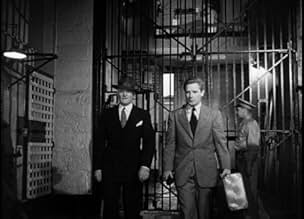AVALIAÇÃO DA IMDb
6,7/10
530
SUA AVALIAÇÃO
A paixão de um condenado em liberdade condicional por uma enfermeira garimpeira que trabalha num sanatório leva-o ao crime.A paixão de um condenado em liberdade condicional por uma enfermeira garimpeira que trabalha num sanatório leva-o ao crime.A paixão de um condenado em liberdade condicional por uma enfermeira garimpeira que trabalha num sanatório leva-o ao crime.
- Direção
- Roteiristas
- Artistas
Harry Morgan
- Garth
- (as Henry Morgan)
Harry Antrim
- Dr. Stone
- (não creditado)
Joe Besser
- Cook
- (não creditado)
Peggie Castle
- Crossroads Tavern Waitress
- (não creditado)
Stephen Chase
- Bartender
- (não creditado)
Paul Dubov
- Stick-Up Man
- (não creditado)
Frank Gerstle
- Stick-Up Man
- (não creditado)
Anne P. Kramer
- Bertie, the Waitress
- (não creditado)
Ralph Montgomery
- Bar Customer
- (não creditado)
Tudor Owen
- Watchman
- (não creditado)
- Direção
- Roteiristas
- Elenco e equipe completos
- Produção, bilheteria e muito mais no IMDbPro
Avaliações em destaque
OUTSIDE THE WALL is a solid B crime movie that delivers everything the genre promises. It might make a nice comparison with TOMORROW IS ANOTHER DAY, released the next year. In both films, an ex-con, newly released, runs into trouble despite their pretty naive aspirations and innocuous personalities.
Probably the main distinguishing characteristic of OUTSIDE THE WALL is the use of Philadelphia locations. It's always fascinating to see a large city back in the middle of the last century. We are usually shown L. A. or N. Y., the Pennsylvania metropolis makes a welcome change.
At the top of the cast list is Richard Basehart. Pretty much an asset in any film, Basehart carries the lead perfectly. His boyish good looks serve the character, a still-young man who never had a chance to experience the world before he was thrown into prison. When he's let out, Basehart meets a stream of women, most of them unworthy of his attentions. Marliyn Maxwell is also well-cast as a brittle, materialistic nurse whom Basehart encounters in his first legitimate job. Her influence leads him to rejoin the criminal life, and plenty of trouble ensues. Among the rest of the cast are Noir favorites, Joseph Pevney, the incredibly prolific John Hoyt and Harry Morgan (who here plays a crime boss with gusto), . Dolores Hart plays Basehart's possible love interest, while Signe Hasso is almost wasted as a money-hungry gangster's wife.
Probably the main distinguishing characteristic of OUTSIDE THE WALL is the use of Philadelphia locations. It's always fascinating to see a large city back in the middle of the last century. We are usually shown L. A. or N. Y., the Pennsylvania metropolis makes a welcome change.
At the top of the cast list is Richard Basehart. Pretty much an asset in any film, Basehart carries the lead perfectly. His boyish good looks serve the character, a still-young man who never had a chance to experience the world before he was thrown into prison. When he's let out, Basehart meets a stream of women, most of them unworthy of his attentions. Marliyn Maxwell is also well-cast as a brittle, materialistic nurse whom Basehart encounters in his first legitimate job. Her influence leads him to rejoin the criminal life, and plenty of trouble ensues. Among the rest of the cast are Noir favorites, Joseph Pevney, the incredibly prolific John Hoyt and Harry Morgan (who here plays a crime boss with gusto), . Dolores Hart plays Basehart's possible love interest, while Signe Hasso is almost wasted as a money-hungry gangster's wife.
In the Hollywood of late '40s and early '50s, Richard Basehart found plenty of work in the noir cycle but never made a major mark, the mark of a Robert Mitchum or Glenn Ford or even a Dick Powell. His good looks were all-American bland - lackluster - and his acting rarely leapt to dangerous voltages. Probably more at home on stage than on the pitiless screen, he leaves one of his fullest performances in a shunted-aside noir, Outside The Wall.
Just 30 but with 15 years in stir behind him (he'd caused the death of an abusive guard when he was just a kid in reform school), he secures an unexpected release from prison. An old lifer grumbles about life outside: `Everybody's got the jitters. A buck ain't worth a buck anymore.' But mo st of all he warns about the `dames,' of whom Basehart knows absolutely nothing. He'll soon find out.
In his first night in Philadelphia, a B-girl feeds him his first taste of liquor and tries to filch his wallet; later, washing dishes, he foils a stickup and, fed up with Brotherly Love, heads for the clean country of Jewel Lake, landing a job as a lab technician at a TB sanitarium. His first patient (John Hoyt) turns out to be an ex-con he knows who's just pulled a fatal armored-car robbery. When Basehart fails to blow the whistle, the dying Hoyt trusts him enough to mule payoff money to his avaricious wife (Signe Hasso).
The straight-arrow Basehart normally wouldn't dirty his hands, but the blonde and mercenary charms of nurse Marilyn Maxwell lead him to rethink his monkish life (`I just found out what money can buy,' he tells her, forking over a platinum bracelet in his new roadster). Still, his stirring conscience beckons him to fess up about his past to good-gal Dorothy Hart. But Hoyt has the means to hold him to his bargain, while his wife and her ruthless accomplices have their own plans for him....
Crane Wilbur, who started way back in the silent era, wrote several noirs and directed a few of them, mostly about prison life (Canon City, The Story of Molly X). Here, he directs his story with some nicely observed vignettes about the dislocation awaiting released felons but, as it advances, less than persuasive plotting. But, in addition to the convincing work he coaxes from Basehart, he assembles a solid cast, with Maxwell and Hasso rivaling one another in duplicity and Hart more appealing than the saintly simp she might have been.
Harry Morgan also appears, as a thug who elicits information by sliding scalpels under fingernails. Interestingly a veteran of even more noirs than Basehart, Morgan played the heavy the year before, too, in Red Light, but couldn't hold a candle to his partner in crime, Raymond Burr. Here, he takes his place amid a balanced cast with intersecting motives that result in a movie that, while satisfying, falls well short of spectacular. Still, it merits more viewers.
Just 30 but with 15 years in stir behind him (he'd caused the death of an abusive guard when he was just a kid in reform school), he secures an unexpected release from prison. An old lifer grumbles about life outside: `Everybody's got the jitters. A buck ain't worth a buck anymore.' But mo st of all he warns about the `dames,' of whom Basehart knows absolutely nothing. He'll soon find out.
In his first night in Philadelphia, a B-girl feeds him his first taste of liquor and tries to filch his wallet; later, washing dishes, he foils a stickup and, fed up with Brotherly Love, heads for the clean country of Jewel Lake, landing a job as a lab technician at a TB sanitarium. His first patient (John Hoyt) turns out to be an ex-con he knows who's just pulled a fatal armored-car robbery. When Basehart fails to blow the whistle, the dying Hoyt trusts him enough to mule payoff money to his avaricious wife (Signe Hasso).
The straight-arrow Basehart normally wouldn't dirty his hands, but the blonde and mercenary charms of nurse Marilyn Maxwell lead him to rethink his monkish life (`I just found out what money can buy,' he tells her, forking over a platinum bracelet in his new roadster). Still, his stirring conscience beckons him to fess up about his past to good-gal Dorothy Hart. But Hoyt has the means to hold him to his bargain, while his wife and her ruthless accomplices have their own plans for him....
Crane Wilbur, who started way back in the silent era, wrote several noirs and directed a few of them, mostly about prison life (Canon City, The Story of Molly X). Here, he directs his story with some nicely observed vignettes about the dislocation awaiting released felons but, as it advances, less than persuasive plotting. But, in addition to the convincing work he coaxes from Basehart, he assembles a solid cast, with Maxwell and Hasso rivaling one another in duplicity and Hart more appealing than the saintly simp she might have been.
Harry Morgan also appears, as a thug who elicits information by sliding scalpels under fingernails. Interestingly a veteran of even more noirs than Basehart, Morgan played the heavy the year before, too, in Red Light, but couldn't hold a candle to his partner in crime, Raymond Burr. Here, he takes his place amid a balanced cast with intersecting motives that result in a movie that, while satisfying, falls well short of spectacular. Still, it merits more viewers.
Larry Nelson (Richard Basehart) is a 29 year old convict who wins his plea for a pardon. But "outside the wall" freedom is initially not so sweet. He was in a reform school at 14 - he describes himself as an incorrigible hood at that age - and when a guard who dislikes him hits him, he hits him back, the guard falls and dies, and Larry is convicted of murder but given life in prison instead of death because of his young age. So he is free with 672 dollars he has earned over the course of his imprisonment (that would be about 12 thousand dollars now), but he has never been on a date, never taken a drink, never driven a car or learned how, never applied for a real job. After a couple of days of bad experiences in the city, he hits the road and "tramps it" to a small town and gets a job as a lab assistant in a hospital for TB patients, hoping just to keep his head down and stay out of trouble. On the way to the small town, he reads about a one million dollar robbery in which three of the robbers were killed and three armored car guards were killed. Two robbers escaped.
And then one of the robbers shows up at the rest home with a bad case of TB. Larry recognizes him from his time in prison, but true to the prison code, tells him he will not rat him out. The robber asks him to help him get some of the robbery loot to his wife in Philadelphia. Larry refuses to help. At first. But then he starts pining for a nurse who is money hungry bad news, and he thinks that some of the robber's money will win her affection, so he agrees to help the ailing robber. Complications ensue.
I would normally be annoyed by somebody who makes the obviously bad and even stupid choices that Larry Nelson makes in this film, figuring that any intelligent 30 year old should know better than to trust such a greedy woman as the nurse he lusts after or the murderous robber who wants his help. But then, Larry Nelson experientially is 14, not 30. Thus he makes the mistakes that any 14 year old would make in the same situation. But he learns fast.
This was really a great part for Basehart. I believe him as the hardened con and I believe him as the naive teenager in a 30 year old body. If you want to see Basehart in another film where he practically has a dual role, watch "Tension". But by all means do see this, as it has suspense, noirish undertones, and a great performance by Basehart.
And then one of the robbers shows up at the rest home with a bad case of TB. Larry recognizes him from his time in prison, but true to the prison code, tells him he will not rat him out. The robber asks him to help him get some of the robbery loot to his wife in Philadelphia. Larry refuses to help. At first. But then he starts pining for a nurse who is money hungry bad news, and he thinks that some of the robber's money will win her affection, so he agrees to help the ailing robber. Complications ensue.
I would normally be annoyed by somebody who makes the obviously bad and even stupid choices that Larry Nelson makes in this film, figuring that any intelligent 30 year old should know better than to trust such a greedy woman as the nurse he lusts after or the murderous robber who wants his help. But then, Larry Nelson experientially is 14, not 30. Thus he makes the mistakes that any 14 year old would make in the same situation. But he learns fast.
This was really a great part for Basehart. I believe him as the hardened con and I believe him as the naive teenager in a 30 year old body. If you want to see Basehart in another film where he practically has a dual role, watch "Tension". But by all means do see this, as it has suspense, noirish undertones, and a great performance by Basehart.
The premise of a convict trying for a fresh start isn't a new one, but I liked the unique characterization or Richard Basehart in Outside the Wall. He plays a young man who's spent more than half his life in prison. While he was a fourteen-year-old in reform school, he beat up a guard (who later died) and was sentenced to murder. After fifteen years, he receives a pardon and is completely unprepared for the outside world. Think about it: the last time he saw the outside, he was a little boy. He's never driven a car, worked at a job, gone on a date, paid bills, or lived on his own. Thrust out into a new world, he gets a job working in a sanitarium and quickly falls for the first blonde who turns his head, Marilyn Maxwell. Dorothy Hart is the brunette nurse with a heart of gold, in contrast to Marilyn's obvious gold digging schemes. Will the innocent protagonist see through her, or will he have to grow up the hard way?
This old movie doesn't feel like it was made in 1950; it feels like it was made in the early 1930s. Everything about it is old-fashioned, from the good girl and bad girl contrast, to the simple filmmaking techniques, to the type of turns the plot takes. I kept expecting Chester Morris to show up with Carole Lombard, Kay Francis, and Shirley Temple. If you like old movies, and especially ex-con movies, try this one out.
This old movie doesn't feel like it was made in 1950; it feels like it was made in the early 1930s. Everything about it is old-fashioned, from the good girl and bad girl contrast, to the simple filmmaking techniques, to the type of turns the plot takes. I kept expecting Chester Morris to show up with Carole Lombard, Kay Francis, and Shirley Temple. If you like old movies, and especially ex-con movies, try this one out.
Richard Basehart went into Cherry Hill Prison when he was 14. Now he's 29, and has just been pardoned. The world has grown noisy and strange, but he just wants to keep his head down, so he winds up in a small town working for almost nothing at a hospital that specializes in lungers. He vaguely hopes to get a girl friend, but doesn't know anything about women, so when nurse Marilyn Maxwell turns him down because she's looking for a rich man, he agrees to help armored-car robber Joseph Pevney get some money to his ex-wife in return for a bankroll. He impresses Miss Maxwell with the money, but the wife's mob wants all of the money from the robbery.
I'm so used to Basehart playing deep-voiced authority figures in the 1960s, that watching him play this young-old fish out of water is startling. Crane Wilbur directs his actors to very simple performances that lead you to think that this is all inevitable, while getting in a subtextual knock at society's unwillingness to accept ex-cons. With Signe Hasso, Dorothy Hart, Lloyd Gough and Harry Morgan.
I'm so used to Basehart playing deep-voiced authority figures in the 1960s, that watching him play this young-old fish out of water is startling. Crane Wilbur directs his actors to very simple performances that lead you to think that this is all inevitable, while getting in a subtextual knock at society's unwillingness to accept ex-cons. With Signe Hasso, Dorothy Hart, Lloyd Gough and Harry Morgan.
Você sabia?
- CuriosidadesJoe Besser appears uncredited as a the diner owner who is held up at gun point early in the film. He later gained fame as a member of the Three Stooges briefly from 1957-59.
- Erros de gravaçãoAt the end of the film when dying criminal Jack Bernard (played by John Hoyt) falsely and vindictively attempts to incriminate Larry Nelson (Richard Basehart) to the police as being his former accomplice in the armoured car robbery, all Larry would have had to do in order to clear himself would be to have his true identity verified by the authorities of the Philadelphia prison from which he had recently been released.
- Citações
Charlotte Maynard: You've got hands like iron. A girl wouldn't have much chance if you really got sore.
Principais escolhas
Faça login para avaliar e ver a lista de recomendações personalizadas
- How long is Outside the Wall?Fornecido pela Alexa
Detalhes
- Data de lançamento
- País de origem
- Idioma
- Também conhecido como
- Outside the Wall
- Locações de filme
- Eastern State Penitentiary - 2124 Fairmont Avenue, Filadélfia, Pennsylvania, EUA(early exterior and interior scenes)
- Empresa de produção
- Consulte mais créditos da empresa na IMDbPro
- Tempo de duração1 hora 20 minutos
- Cor
- Proporção
- 1.37 : 1
Contribua para esta página
Sugerir uma alteração ou adicionar conteúdo ausente

Principal brecha
By what name was Homem Marcado (1950) officially released in India in English?
Responda



































